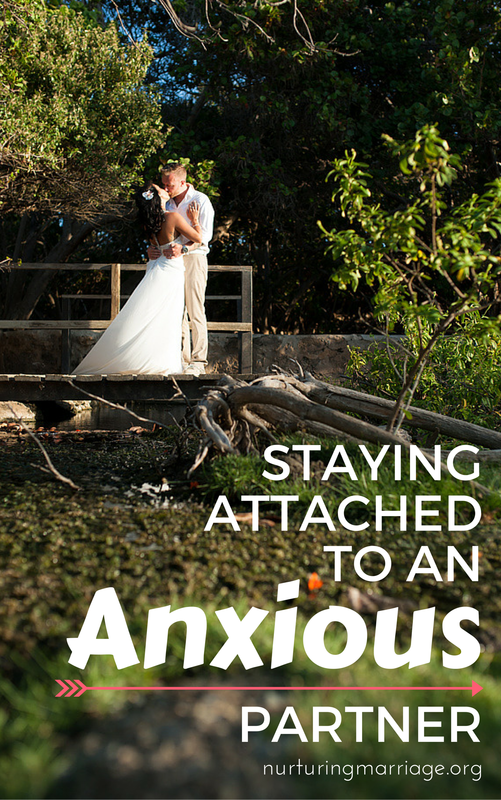|
Written by The Relate Institute
Previously I shared some ways to stay connected to a partner who prefers to avoid closeness. What about a partner who seems to want too much closeness? Do you have a partner who you feel like smothers you or never gives you enough space? Rather than avoiding closeness, these partners want closeness, but sometimes aren’t sure how to handle the closeness they get.
Avoidant attachment is only one dimension in how people connect to others. Those who are high in the other dimension, called anxiety, may be just as difficult to connect with, but in different ways. Early in life, anxious individuals were often lacking important, supportive relationships. When they do connect with people later on, it fills a large gap in their life, which also makes them very afraid of losing the relationship. This fear makes them very anxious and reactive when something seems to go wrong in the relationship. In the same review of research I shared before, the scholars explored the effects of anxious attachment on relationships. While difficult, again they show that it is possible to have a successful and happy relationship with an anxious partner.
1. Intrusive Boundaries
Anxiously attached individuals feel safest when their partner is available to them. This may lead them to contact you frequently when you are away, or always want to be near you when you are together. Early on in a relationship, they may share more with you than you are ready for. All of these behaviors can make you feel uncomfortable and feel like an intrusion on your personal space. What you can do When you find yourself with an anxious partner, give them assurances throughout the day that you care about them. It may be annoying to have to respond to a text or phone call every five minutes, but if you ignore them they will only get more anxious. Instead, try setting your own routine of contacting them throughout the day at regular intervals that are more manageable. For example, call them once or twice to give them updates on your day. Taking the initiative in this way will provide the predictability they need, but allow you to set reasonable boundaries that you feel comfortable with.
2. Handling conflict
While avoidant partners are often not very confrontational, anxious partners can be very volatile and react with extreme emotions if they think something is going wrong. Because of this, they might often find something wrong with everything you do, and then confront you about it. What you can do No one really likes to argue, but you may think your partner does. The truth is that anxious individuals often jump to worse-case scenarios. Think about how often you call your partner during the day. Many anxious individuals may call you every hour because they fear you are with someone else. While it is very unlikely that most people would begin an affair in an hour, anxious individuals are often emotionally driven rather than logically driven. When your partner starts to question your behavior or motives, responding with defensiveness or a return of strong emotions may just confirm in their mind that they are right. Instead, remain calm and try to calm your partner down. Don’t make this about you, but walk them through their own thoughts using logic to combat the emotions. The key here is to keep from sounding defensive and to show your spouse that he or she is your first concern. 3. Predictability and Security The greatest need of anxious individuals is to feel that the world around them is predictable. Anytime something unexpected happens they are likely to feel insecure about the relationship and themselves. The obvious next step is to put up their defenses. These may come in the form of leaving the relationship with little or no explanation, or feelings of unworthiness and undesirability. Your partner may increase in intrusive or emotionally driven behaviors. What you can do The key to staying connected to an anxious partner is that they want to feel close. By keeping your relationship patterns as predictable as possible, and helping the anxious partner feel safe with your routines, your relationship can be very fulfilling for both of you. Be consistent and intentional about how you relate to your partner. When change does need to happen in a routine, take it slowly and only make minor changes so your partner can adjust to the new routines in a way that feels safe to them. Explain what you are doing and why you are doing it so they are less likely to second-guess your motives. It takes a lot of work and discipline to create a secure and safe relationship for anxious individuals, but showing your partner that they are safe with you will help them find security in many different kinds of relationships. To see where you fall on the attachment spectrum, try taking our RELATE or READY assessments. Read the original article here.
Photo Credit: Crooze Photography
You may also enjoy Creating Your Marriage Bucket List and 5 Ways to Get Your Husband to Be a Romantic
2 Comments
SCOTT WYCOFF
6/14/2022 01:17:49 pm
Hi, did you know there are spells to win love back from an ex. I have done it. I love reading about relationships and how to make them work, how to better the relationship, and how to keep the spark alive, even how to talk to them a certain way to get them to think a different way about the situation and you. If you need advice or want to win your ex back, try DR EMU copy and message on the following ( Email: [email protected] ) or ( WhatsApp: +2347012841542 ) It will change your mentality and get you what you want. Facebook page Https://web.facebook.com/Emu-Temple- 104891335203341
Reply
Rachael Mildred
1/22/2024 09:33:11 am
EFFECTIVE LOVE SPELL TO GET EX HUSBAND/BOYFRIEND OR EX WIFE/GIRLFRIEND AND CURE HERPES AND INFERTILITY THAT WORKS WITHIN 24 HOURS.
Reply
Leave a Reply. |
Conflict
|


 RSS Feed
RSS Feed


